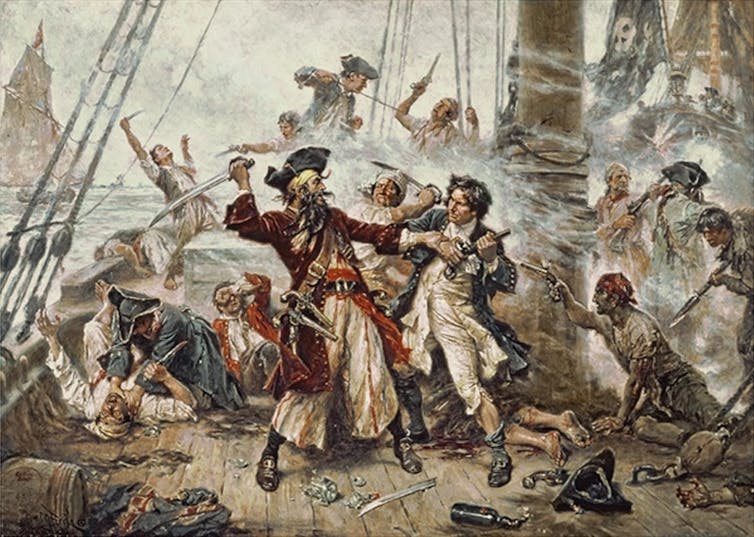
Mark Chadwick, Nottingham Trent University
The Nuremberg and Tokyo trials, convened in the aftermath of World War II, are usually identified as the start of modern international criminal law. Prosecutions of international crime today take place either at international courts such as the permanent International Criminal Court in The Hague or, increasingly, in domestic courts, under the principle of universal jurisdiction.
As I argue in a new book, modern international criminal law is actually of a much older lineage, and is descended from the pursuit of pirates, the original “universal enemy”.
Pirates may seem to bear little resemblance to modern-day international criminals, prosecuted for genocide, crimes against humanity, war crimes or aggression. But history tells us otherwise – and provides a lesson in how international justice is understood and pursued today.
Historical pirates are often portrayed as anti-heroes, taking on the establishment in movies, TV series, and books. They inspire fancy dress and strange accents.
But pirates once challenged the emergence of the enterprising territorial state that forms the basis of today’s international order. Piratical tribes, for instance, posed a serious threat to the Roman Republic, prompting a military offensive led by General Pompey.

In the late 17th and early 18th centuries, piracy threatened colonialist Europe. Pirates such as Edward Teach (known as Blackbeard), Charles Vane and Anne Bonney represented chaos rather than ordered civilisation. According to Dutch jurist Hugo Grotius, writing in 1604, there could be: “No stronger reason underlying our abhorrence of pirates than the fact that they besiege and render unsafe the thoroughfares of human intercourse.”
European states met the challenge with an innovative response. England, in particular, pioneered the use of universal jurisdiction. This was the idea that any court could prosecute any pirate, regardless of where they came from or where their crime had taken place. At the 1696 trial of the pirate Henry Avery’s crew at the Central Criminal Court in London (“the Old Bailey”), the court claimed that it was within its powers to punish all piracy at sea, wherever it happened in the world. Pirates were denounced as the enemies of international, or universal, values.
This same reasoning forms the basis for trials of international criminals today, who may also be subject to universal jurisdiction by domestic courts. The recent trial of former Chadian dictator Hissène Habré in the Extraordinary African Chambers of Senegal’s domestic court system was a case in point. So too have been attempts by European courts, led by Germany and Sweden to pursue several Syrian and Iraqi war criminals. On January 10, 2019, a former Iraqi soldier was convicted of war crimes at the Helsinki District Court in Finland.
Read more: African trial of Chadian dictator Habré is a landmark against impunity
Changing international concerns
The swashbuckling pirate seems hardly comparable to today’s génocidaires or war criminals. Our perception of pirates has aged well, no doubt due to the romantic portrayal of piracy in the intervening years. Yet, piracy during the 17th and 18th centuries posed a genuine existential threat to society. By the 20th century, the right of states to use universal jurisdiction in response to pirates had become enshrined in an international treaty.

Large-scale human rights violations were not, however, considered in the same light, at least until fairly recently. What governments did to their own people wasn’t considered to be an international issue. Attitudes only began to shift following the atrocities committed by the Nazi regime during World War II. With the emergence of the human rights movement and the work of scholars such as Raphael Lemkin, international concern turned to the suffering at the hands of their own governments.
This shift in perspective inspired the Nuremberg trials. The first UN secretary-general, Trygve Lie, suggested that “piracy would be the appropriate (historical) parallel” for the trials of surviving senior Nazis. At the 1961 trial of Adolf Eichmann in Jerusalem – held under universal jurisdiction – the Israeli Supreme Court considered pirate trials to be a natural precedent for the Nazi’s prosecution.
Adapting to new threats
The process by which crimes become “international” is a dynamic process. The study of piracy shows that the international community singles out the acts it believes pose the greatest harm to humanity and elevates them to the status of “international crime”.
The next wave of international offences could, in time, cover such pressing concerns as terrorism, gender-based crimes or environmental crimes. These could then be prosecuted at international courts or at domestic courts under the principle of universal jurisdiction.
The study of piracy also shows that there is an ancient lineage to the use of universal jurisdiction. Today, courts around the world use this principle to bring to justice perpetrators of heinous offences. Although the principle has come under attack, courts are arguably doing what they have always done in order to protect the universal values held by humanity as a whole.
Mark Chadwick, Lecturer in Law, Nottingham Trent University
This article is republished from The Conversation under a Creative Commons license. Read the original article.
